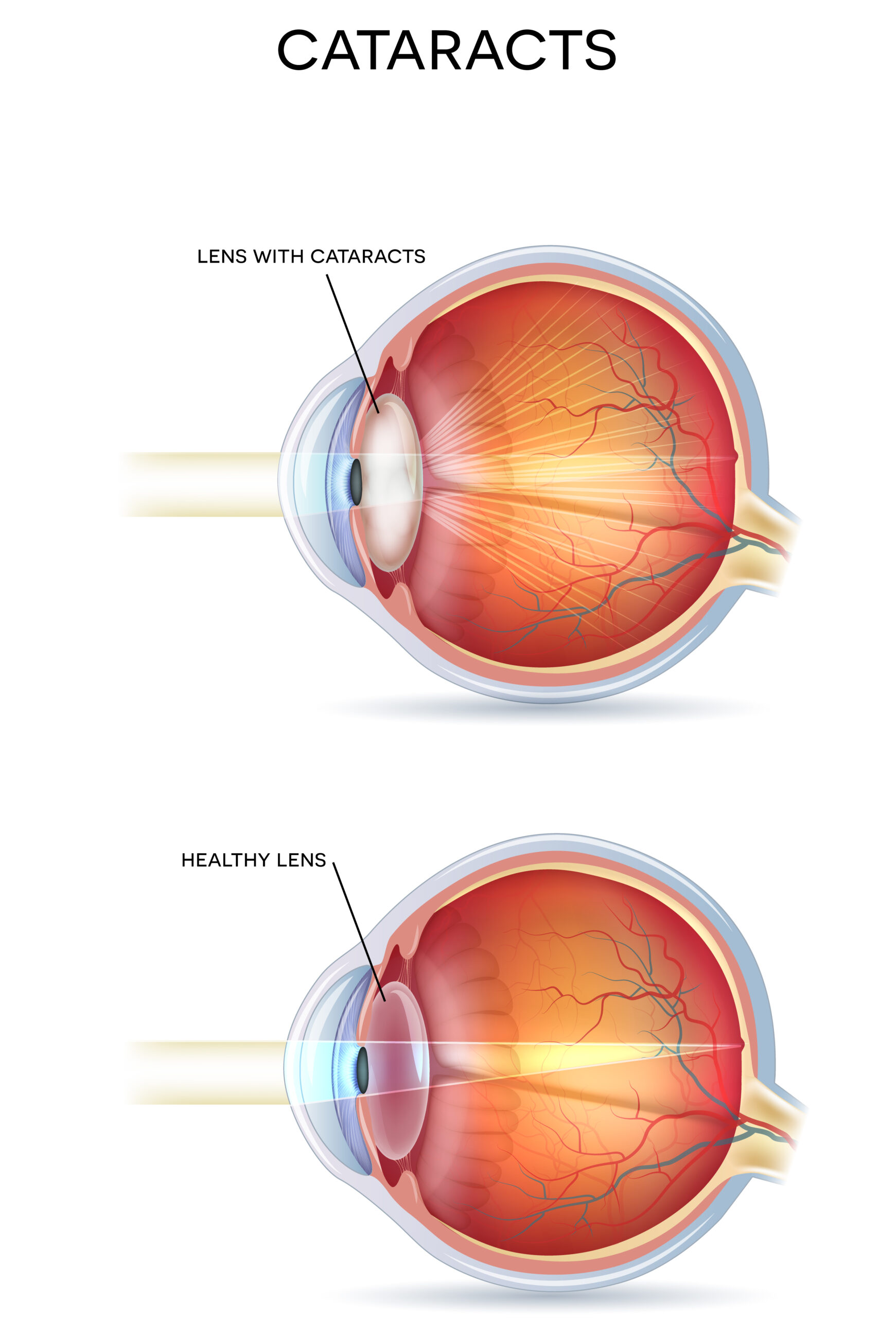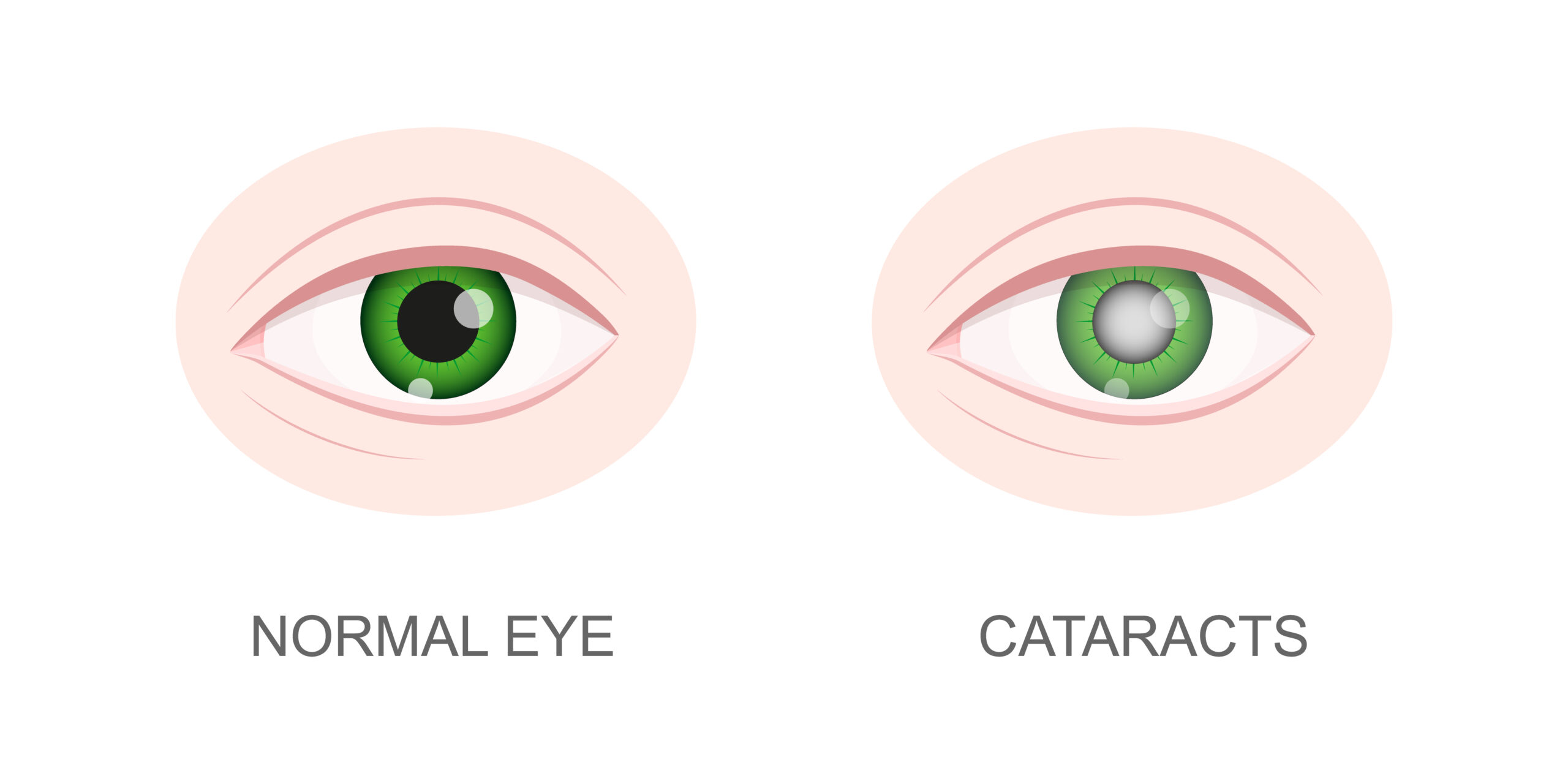Services
Call Us
Hours
Monday: 8 AM – 4:30 PM
Tuesday: 8 AM – 4:30 PM
Wednesday: 8 AM – 4:30 PM
Thursday: 8 AM – 4:30 PM
Friday: 8 AM – 2:30 PM
Download

About Florida Eye Surgeons And Associates
What Is A Cataract?

The eye’s lens is crucial to vision, it focuses light onto the retina, allowing us to see clear images. However, as cataracts form, the lens becomes cloudy, and the clouding leads to scattering and distorting the light image entering the eye producing blurred, hazy vision. It may feel like looking through a foggy window or having difficulty seeing clearly, especially in bright light or at night.
Who Is At Risk For Cataracts?
Several factors can increase the risk of developing cataracts. These risk factors include:
- Age: Cataracts are more common as people age. Typically, they become symptomatic in the late 50s and older, but they can be significant at any age.
- Family History: If you had a family member who had early onset cataracts, you are at a higher risk of developing them at an earlier age.
- Diabetes: Individuals with diabetes are at an increased risk of developing cataracts, particularly if their diabetes is not well controlled.
- Smoking: Smoking has been linked to an increased risk of cataract development.
- Ultraviolet (UV) Radiation: Prolonged exposure to UV rays from the sun can contribute to cataract formation.
- Eye Trauma or Injury: Previous eye injuries or trauma may increase the risk of developing cataracts.
- Prolonged Corticosteroid Use: Long-term use of corticosteroid medications, whether in the form of eye drops, oral pills, or injections, may increase the risk of cataracts.
- Obesity: Being overweight or obese has been associated with a higher risk of cataracts.
- High Blood Pressure: Hypertension may be a risk factor for cataracts.
- Excessive Alcohol Consumption: Heavy alcohol consumption may increase the risk of cataracts.
- Certain Medications: Some medications, such as those used to treat psoriasis, may increase the risk of cataracts.
Regular eye exams are essential for early detection and proper management of cataracts and other eye conditions. If you have concerns about your eye health or cataract risk, consult our medical professionals for guidance and appropriate care.
Cataract Symptoms

Cataracts can develop in one or both eyes and may progress at different rates.
Some common symptoms of cataracts include:
- Blurred or cloudy vision
- Difficulty seeing in low-light conditions or in the dark
- Increased sensitivity to glare from lights, for example, vehicle headlights
- Fading or yellowing of colors
- Double vision in one eye
- Needing brighter light for reading or other tasks
Cataract Treatment Options
Cataracts can significantly impact daily activities and quality of life. To determine the best treatment option tailored to your unique circumstances, our educated medical team will carefully discuss your individual needs and situation with you.
There are two treatment options for cataracts:
Observation: One option is to observe the cataract. Although it may impair vision, it does not cause any damage to the eye structures. Changes in your glasses prescription may be medically necessary in the early stages.
Surgery: Cataract surgery involves removing the eye’s clouded natural lens and replacing it with an artificial intraocular lens (IOL). This procedure has high success rates and is performed on an outpatient basis with a general quick recovery. Cataract surgery is indicated when you have significant vision loss that affects your quality of life.
At Florida Eye Surgeons and Associates, we use the most innovative form of cataract surgery called phacoemulsification. This procedure involves creating a small incision in the cornea and using ultrasound energy to break up the cloudy lens into tiny fragments. The fragments are removed, and an artificial IOL is inserted through the same incision.
How Successful Is Cataract Surgery?
Cataract surgery is highly successful, with most patients experiencing improved vision and quality of life after the procedure. However, like any surgical procedure, it carries some risks, such as infection, corneal or retinal swelling, or retinal detachment. Our eye surgeons will discuss the potential risks and benefits of cataract surgery with you before proceeding.
Cataracts will eventually progress, and surgery may become necessary to restore clear vision. If you suspect you have cataracts or have been diagnosed with them, consult our eye care professionals to discuss the best treatment plan for your situation.
Why Choose Florida Eye Surgeons And Associates?
At Florida Eye Surgeons and Associates, we are proud to be the top choice for your eye health. With our experienced team and advanced technology, we focus on your vision and overall well-being. Our commitment to personalized care and high-quality services is what sets us apart. Count on our excellent reputation, positive patient experiences, and caring approach for the best eye care.
Contact us to schedule an appointment. Together, we can take a step toward brighter, healthier vision ahead.
